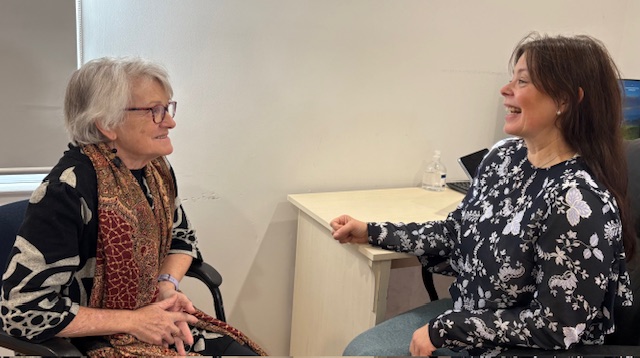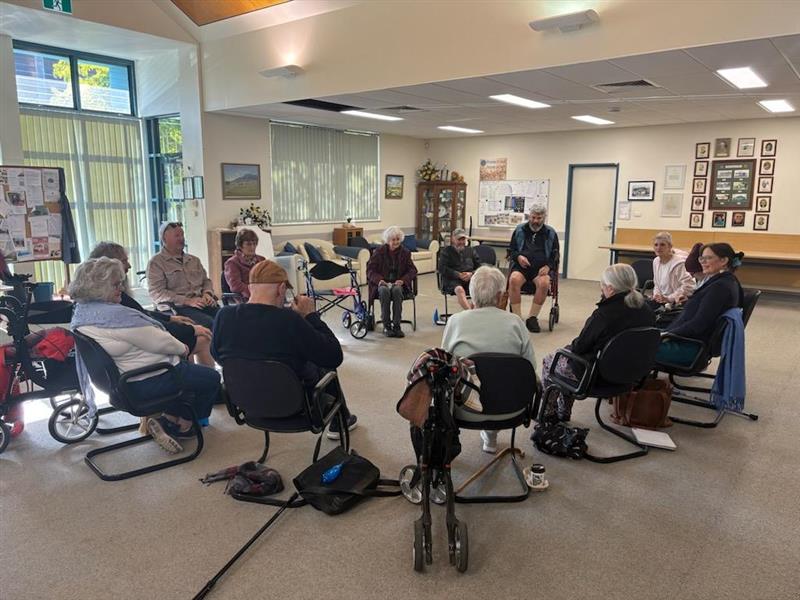
Parkinson's Disease can impact speech and swallowing, often later in the disease process but sometimes it can be amongst the first symptoms.
Typical speech symptoms associated with Parkinson's disease can include:
Many people with Parkinson's experience people asking them to repeat themselves, or to speak up, which can get frustrating. Due to Parkinson's disease having both motor (muscle movement) and sensory (input to the brain) symptoms, people with Parkinson's do not hear their voice as being too quiet and will think they are being loud enough.
Some people with speech issues will start to withdraw socially and isolate, as it becomes too hard for them to communicate. Unfortunately this leads to further deterioration in their speech, due to lack of practice (Use it or Lose it!) as well as decreased mood due to lack of socialisation (humans are definitely meant to be a social species).
The great news with speech issues related to Parkinson's disease is that they can be improved quickly, effectively and with excellent results due to well researched, evidence based therapies. It is one of the delights of being a Speech Pathologist to hear someone with Parkinson's go from being very quiet to a normal sounding voice within a session. It is even more wonderful when a relative says "That sounds like their old voice - I haven't heard that voice in years!"
Ruth Hartman has worked with people with Parkinson's for over twenty years, supporting them to improve their speech and keep it functional. Ruth has had extensive training in voice disorder management and brings all those skills and knowledge to provide best practice speech and voice treatment for people with Parkinson's.
Ruth is trained in:
Ruth also provides monthly LSVT LOUD support groups to help people keep their voice LOUD .The group meets on the 2nd Thursday of the month in the CWA rooms in Nowra and members have all trained in LSVT. - Read more

Lee Silverman Voice Treatment®
LSVT is an intensive voice treatment involving four hour long sessions per week for four weeks (16 sessions in total). There have been three randomised controlled trials to prove its efficacy and it has been helping people with Parkinson's for over twenty five years. The focus of the sessions is on having a LOUD voice. Based on neuroplasticity and motor learning principles, the sessions focus on building good quality voice, then repeating the exercises to build strength, endurance, flexibility and resilience. The exercises are accompanied with extra physical and cognitive challenges to build greater generalisation and skill. Daily functional tasks are given to help generalise the voice into everyday life. The clinician also works with the client to help them recalibrate their ability to hear their own vocal loudness levels. Daily practice post therapy is required to maintain gains.
See www.lsvtglobal.com for more information.
Ruth provides monthly LSVT LOUD group sessions to help people stay motivated and keep their voices LOUD. All members have done the LSVT (either with Speech for Life or alternative provider). We meet the second Tuesday of each month in the CWA rooms. We are a friendly bunch, come join us!
People who have had Deep Brain Stimulation (DBS) may experience different speech symptoms after their DBS. Some people will have improved speech, some will have no change, some will experience worsened speech, with increased speech rate, voice changes and slurred speech. People post DBS will respond to LSVT, but may need increased sessions to get the same results.
Note: LSVT can be provided with funding from NDIS, DVA, Aged Care packages and under the Short Term Restorative Care programme.
Speak Out!
Speak Out is a similar intensive speech evidence based speech treatment, requiring 10-12 sessions with a focus on 'Speaking with Intent'. Following treatment, there are weekly online group sessions to support ongoing practice and maintenance of the skills.
See parkinsonvoiceproject.org for more information
Expiratory Muscle Strength Training (EMST)
EMST was designed for athletes and musicians to help expand their breathing skills. Research has now been done into using EMST in Parkinson's Disease and it has been shown to boost breath support for louder speech. It can also improve swallowing function and cough strength - important in swallowing safety.
For more information go to emst150.com
Vocal Fold Injections (Laryngoplasty)
Ear, Nose and Throat Specialists can inject natural or synthetic materials into the vocal folds to build up their bulk so that they close more fully when vibrating, producing louder and clearer voice. Effects can last from 3-6 months and can be repeated. Your GP will need to refer you for this treatment and the ENT can discuss with you whether you are a suitable candidate.
Alternative and Augmentative Communication
Wearable microphones can make the voice louder when out in public, helping the person be heard over background noise. If speech is slurred or the voice too quiet, voice to speech apps can be used or a simple alphabet board to assist with showing the listener the first letter of each word. The Speech Pathologist can advise as to which system may suit your needs best.
Swallowing issues can occur at any stage in Parkinson's. Typical symptoms include:
See our page on dysphagia on this website for more information on general swallowing issues and treatments.
Ruth Hartman will provide a full assessment of your swallowing and find solutions to support your safe mealtime management. There are many things that can be done to manage swallowing issues - both to try and rehabilitate the swallow as well as to compensate for the difficulties.
For more information on Parkinson's Disease, see these Australian reputable websites:
For Parkinson's support groups, contact Parkinson's NSW on supportgroups@parkinsonsnsw.org.au
There are support groups in Nowra, Milton - Ulladulla and Kiama.
Discover tailored speech therapy for adults and late teens. Our friendly team helps you build confidence and communication skills in a welcoming, supportive environment.